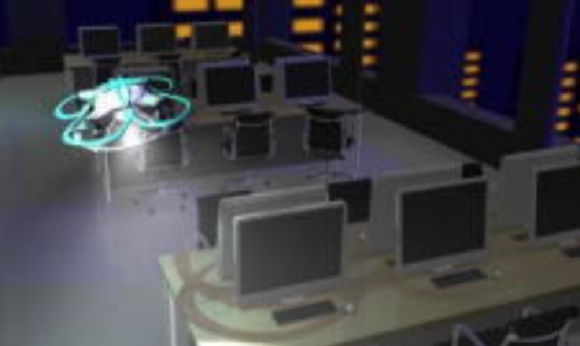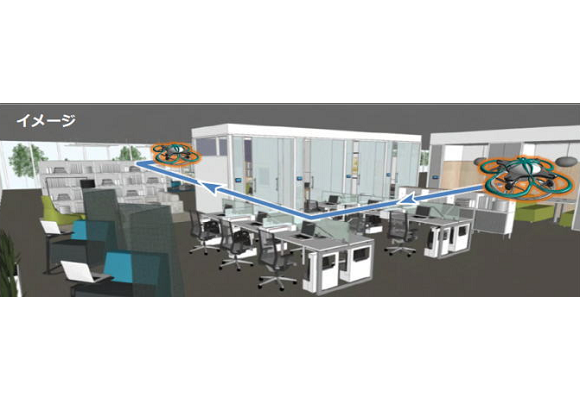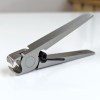
Developers say it’s a great way to improve employee health.
While massive amounts of overtime remains a prominent aspect of many jobs in Japan, recently there’s been a slight shift in attitudes. Compared to the past at least, more companies today are willing to say, “You know, if so many of our employees are still at their desks long after the workday is supposed to be done, maybe they’re dangerously overworked.”
So for organizations looking to reduce the amount of overtime being done in their offices, telecommunications giant NTT has helped to create a new service in which companies can have flying drones patrol their offices and see if anyone is still working after quitting time.
The T-Frend system was developed in cooperation with Tokyo-based drone manufacturer Blue Innovation and Taisei, a building management provider headquartered in Nagoya. Users select a flight course and time for the drones, which are fully automated, requiring neither an operator nor GPS data, as they navigate using their onboard cameras. As the drones make their rounds, they record what they see and upload it to the user’s cloud, utilizing NTT’s technical know-how.
T-Frend is scheduled to begin testing in the spring, and to officially launch next October. It’s touted as a way to both curb overtime for the improvement of employee health and boost information security by having fewer people in the office late at night. In its press release, NTT says the service was created as an answer to a dilemma in which companies want their employees to work less overtime, but having to monitor employees and implement overtime-reduction strategies was creating excess work for the employees tasked with those responsibilities.
However, it’s unclear how exactly having monitoring drones flying overhead is going to prevent excessive overtime work, except maybe by giving the office a dystopian man-versus-machine vibe that has all the humans wanting to get out of there as quickly as possible. Yes the drones will be able to see workers because of their cameras, but will they interact with them? Will they give out friendly, sage advice to help the staff wrap up their projects quickly and efficiently? Play the Rocky theme to give them an energy boost?
The apparent absence of any way for the drones to actually help overtime-working employees seems like a pretty major oversight. Generally speaking, people who’re doing overtime in Japan aren’t doing it because they want to, but because they feel like they have to. Unleashing drones at a certain time each day, like they’re a time-limit enforcer in a video game, doesn’t seem like it’ll do anything except ratchet up pressure on workers to finish their assignments by the standard quitting time…but if that’s something they could do so easily, they wouldn’t be doing overtime in the first place. So while T-Frend might indeed be a viable office security system, it doesn’t seem like it’s really going to help with the problem of overworked employees, since it sounds like it’ll reduce their options to either working twice as hard during their already too-bus day, or having to hide under their desks as they do overtime.
Source, images: NTT East Japan


 Tokyo company plays Rocky theme for workers every day to cut overtime, boost productivity
Tokyo company plays Rocky theme for workers every day to cut overtime, boost productivity Vending machines in Tokyo Station not getting restocked, exploitative “black company” to blame
Vending machines in Tokyo Station not getting restocked, exploitative “black company” to blame Which jobs in Japan have the most and least overtime? Survey investigates
Which jobs in Japan have the most and least overtime? Survey investigates Tokyo advertising company institutes mandatory lights-out time following employee suicide
Tokyo advertising company institutes mandatory lights-out time following employee suicide Japan’s “workstyle reforms” are actually making managers’ jobs a lot harder【Survey】
Japan’s “workstyle reforms” are actually making managers’ jobs a lot harder【Survey】 Foreigner’s request for help in Tokyo makes us sad for the state of society
Foreigner’s request for help in Tokyo makes us sad for the state of society Seaside scenery, history, and so many desserts on Yokohama’s Akai Kutsu【Japan Loop Buses】
Seaside scenery, history, and so many desserts on Yokohama’s Akai Kutsu【Japan Loop Buses】 Should you add tartar sauce to Japanese curry rice? CoCo Ichi makes diners an unusual offer
Should you add tartar sauce to Japanese curry rice? CoCo Ichi makes diners an unusual offer Japanese city loses residents’ personal data, which was on paper being transported on a windy day
Japanese city loses residents’ personal data, which was on paper being transported on a windy day Harajuku Station’s beautiful old wooden building is set to return, with a new complex around it
Harajuku Station’s beautiful old wooden building is set to return, with a new complex around it Red light district sushi restaurant in Tokyo shows us just how wrong we were about it
Red light district sushi restaurant in Tokyo shows us just how wrong we were about it Osaka governor suggests lowering voting age to 0 to curb population decline
Osaka governor suggests lowering voting age to 0 to curb population decline Japanese ramen restaurants under pressure from new yen banknotes
Japanese ramen restaurants under pressure from new yen banknotes Expensive Japanese nail clippers: Are they worth it?
Expensive Japanese nail clippers: Are they worth it? Japan’s massive matcha parfait weighs 6 kilos, contains hidden surprises for anyone who eats it
Japan’s massive matcha parfait weighs 6 kilos, contains hidden surprises for anyone who eats it McDonald’s new Happy Meals offer up cute and practical Sanrio lifestyle goods
McDonald’s new Happy Meals offer up cute and practical Sanrio lifestyle goods French Fries Bread in Tokyo’s Shibuya becomes a hit on social media
French Fries Bread in Tokyo’s Shibuya becomes a hit on social media Studio Ghibli releases new action figures featuring Nausicaä of the Valley of the Wind characters
Studio Ghibli releases new action figures featuring Nausicaä of the Valley of the Wind characters New private rooms on Tokaido Shinkansen change the way we travel from Tokyo to Kyoto
New private rooms on Tokaido Shinkansen change the way we travel from Tokyo to Kyoto Tokyo Tsukiji fish market site to be redeveloped with 50,000-seat stadium, hotel, shopping center
Tokyo Tsukiji fish market site to be redeveloped with 50,000-seat stadium, hotel, shopping center Beautiful Ghibli sealing wax kits let you create accessories and elegant letter decorations【Pics】
Beautiful Ghibli sealing wax kits let you create accessories and elegant letter decorations【Pics】 Studio Ghibli releases Kiki’s Delivery Service chocolate cake pouches in Japan
Studio Ghibli releases Kiki’s Delivery Service chocolate cake pouches in Japan New definition of “Japanese whiskey” goes into effect to prevent fakes from fooling overseas buyers
New definition of “Japanese whiskey” goes into effect to prevent fakes from fooling overseas buyers Our Japanese reporter visits Costco in the U.S., finds super American and very Japanese things
Our Japanese reporter visits Costco in the U.S., finds super American and very Japanese things All-you-can-drink Starbucks and amazing views part of Tokyo’s new 170 meter-high sky lounge
All-you-can-drink Starbucks and amazing views part of Tokyo’s new 170 meter-high sky lounge More foreign tourists than ever before in history visited Japan last month
More foreign tourists than ever before in history visited Japan last month New Pokémon cakes let you eat your way through Pikachu and all the Eevee evolutions
New Pokémon cakes let you eat your way through Pikachu and all the Eevee evolutions Disney princesses get official manga makeovers for Manga Princess Cafe opening in Tokyo
Disney princesses get official manga makeovers for Manga Princess Cafe opening in Tokyo Sales of Japan’s most convenient train ticket/shopping payment cards suspended indefinitely
Sales of Japan’s most convenient train ticket/shopping payment cards suspended indefinitely Sold-out Studio Ghibli desktop humidifiers are back so Totoro can help you through the dry season
Sold-out Studio Ghibli desktop humidifiers are back so Totoro can help you through the dry season Japanese government to make first change to romanization spelling rules since the 1950s
Japanese government to make first change to romanization spelling rules since the 1950s Ghibli founders Toshio Suzuki and Hayao Miyazaki contribute to Japanese whisky Totoro label design
Ghibli founders Toshio Suzuki and Hayao Miyazaki contribute to Japanese whisky Totoro label design Doraemon found buried at sea as scene from 1993 anime becomes real life【Photos】
Doraemon found buried at sea as scene from 1993 anime becomes real life【Photos】 Tokyo’s most famous Starbucks is closed
Tokyo’s most famous Starbucks is closed One Piece characters’ nationalities revealed, but fans have mixed opinions
One Piece characters’ nationalities revealed, but fans have mixed opinions We asked a Uniqlo employee what four things we should buy and their suggestions didn’t disappoint
We asked a Uniqlo employee what four things we should buy and their suggestions didn’t disappoint Princesses, fruits, and blacksmiths: Study reveals the 30 most unusual family names in Japan
Princesses, fruits, and blacksmiths: Study reveals the 30 most unusual family names in Japan Japan’s better farming through precision drone strikes
Japan’s better farming through precision drone strikes Awesome “Poké-drone” video shows how to catch the monsters in Pokémon Go from the air【Video】
Awesome “Poké-drone” video shows how to catch the monsters in Pokémon Go from the air【Video】 Japanese politicians want workers across country to have option for three-day weekends every week
Japanese politicians want workers across country to have option for three-day weekends every week Is this common Japanese phrase for “goodbye” the reason for Japan’s crazy overtime hours?
Is this common Japanese phrase for “goodbye” the reason for Japan’s crazy overtime hours? Is Japan overworking its teachers? One exhausted educator says, “YES!”
Is Japan overworking its teachers? One exhausted educator says, “YES!” Drones capture shocking footage of flooding in Ibaraki, Japan【Video】
Drones capture shocking footage of flooding in Ibaraki, Japan【Video】 Japan’s ‘agri-tech’ farming revolution
Japan’s ‘agri-tech’ farming revolution Overworked Japanese employees mourn unused paid holidays at new Buddhist memorial service
Overworked Japanese employees mourn unused paid holidays at new Buddhist memorial service Flying beef bowls?!? Yoshinoya completes drone delivery of its signature gyudon【Video】
Flying beef bowls?!? Yoshinoya completes drone delivery of its signature gyudon【Video】 Spend a shift working in a terrible, soul-crushing Japanese company at this “special” Tokyo event
Spend a shift working in a terrible, soul-crushing Japanese company at this “special” Tokyo event Japanese government’s newest plan to fight overwork: Give employees Monday morning off
Japanese government’s newest plan to fight overwork: Give employees Monday morning off Japanese company uses video game-style hit point badges to help employees know who needs a hand
Japanese company uses video game-style hit point badges to help employees know who needs a hand Japan’s first drone high school course to begin next year, teaches piloting, law, and more
Japan’s first drone high school course to begin next year, teaches piloting, law, and more Woman sues Tokyo company after having to work 48 days in a row with limited bathroom breaks
Woman sues Tokyo company after having to work 48 days in a row with limited bathroom breaks Sayonara, suits! One of Japan’s biggest companies ditches suit-and-tie dress code
Sayonara, suits! One of Japan’s biggest companies ditches suit-and-tie dress code Japanese worker gets asked by boss to stay after tele-meeting for surprisingly cute reason
Japanese worker gets asked by boss to stay after tele-meeting for surprisingly cute reason Awesome Japanese company wins Internet’s heart with its special coronavirus bonus for employees
Awesome Japanese company wins Internet’s heart with its special coronavirus bonus for employees
Leave a Reply